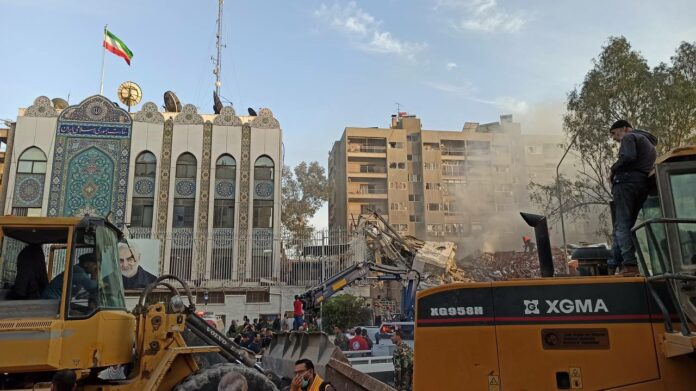China has responded to Iran’s unprecedented airborne attack on Israel at the weekend with calls for calm and an immediate ceasefire in Gaza.
Chinese envoy to the United Nations Dai Bing called the attack “the latest spillover” from the Israeli-Gaza conflict and a reminder of the importance of the “Palestinian question to long-term regional stability.”
Iran and allies based in Iraq, Syria, Lebanon and Yemen fired a total of 350 ballistic missiles, cruise missiles, rockets, and “suicide drones,” Israel Defense Forces spokesperson Daniel Hagari said in statement. The assault was “thwarted,” with 99 percent of the projectiles intercepted by Israeli air defenses in coordination with the U.S. and other partners in the region.
The attack, Iran’s first against the U.S. ally after years of on-and-off conflicts between Israel and Iran-backed proxies, was in response to a suspected Israeli airstrike against an Iranian consulate building in the Syrian capital Damascus on April 1. The bombing killed two senior Iranian generals.
Ammar Ghali/Anadolu via Getty Images
Tehran has claimed it has acted in self-defense in line with the U.N. Charter.
Israel’s foreign ministry did not immediately respond to a written request for comment.
“China calls on relevant parties to exercise maximum calm and restraint and resolve their differences and disputes in accordance with the purposes of the U.N. Charter and international law to prevent further escalations,” Ambassador Dai said during Sunday’s U.N. Security Council briefing on the situation in the Middle East.
He expressed “deep concern” over the latest escalation in regional tensions but stopped short of criticizing Iran or associated militant organizations. He stressed the need to implement the Security Council resolution adopted last month that demands an immediate ceasefire and release of Israeli hostages.
Dai also reiterated Iran’s position that the attack was a one-off strike in retaliation for the April 1 consulate bombing, which the envoy called a “grave violation of the U.N. Charter and international law and a breach of the sovereignty of both Syria and Iran.”
Dai’s comments show China is strengthening its strategic alignment with Russia and Iran, Tuvia Gering, a researcher at the Tel Aviv University-affiliated Institute for National Security Studies, told Newsweek, pointing out Beijing’s statements have reflected Tehran’s talking points—namely that the attack was retaliation against Israel for allegedly striking the consulate compound.
The researcher noted that China has criticized Iran when its interests are threatened, such as when the Tehran-affiliated Houthis claimed responsibility for the 2019 strike on Saudi Aramco oil processing facilities in Beijing’s “more important partner Saudi Arabia,” an attack that also forced China to pay more for its oil.
“And with China doing the math, they see Iran as more important now than Israel,” Tuvia said. This is because Beijing understands that sympathy for Israel is short-lived and that the U.S. as Israel’s primary supporter, will find itself further isolated in its continued support.
China also hopes the U.S. will commit more security forces to the region at the expense of Washington’s pivot to the Asia-Pacific, Gering believes.
Iran’s Revolutionary Guard Corps has claimed responsibility for launching missiles and drones on Sunday. Iran-backed Islamist group Hezbollah said it had fired rocket barrages at a military base in the Golan Heights, which Israel has occupied since taking control of the area in the 1967 Six-Day War.
Benny Gantz, a key member of Israel’s War Cabinet, on Sunday vowed his country would “exact a price” for the attack when the timing is right.
That same day, Iranian President Ebrahim Raisi warned “any new steps taken against the interests of [the] Iranian nation will be met with a stronger response bringing the enemy’s regret.”
Uncommon Knowledge
Newsweek is committed to challenging conventional wisdom and finding connections in the search for common ground.
Newsweek is committed to challenging conventional wisdom and finding connections in the search for common ground.


